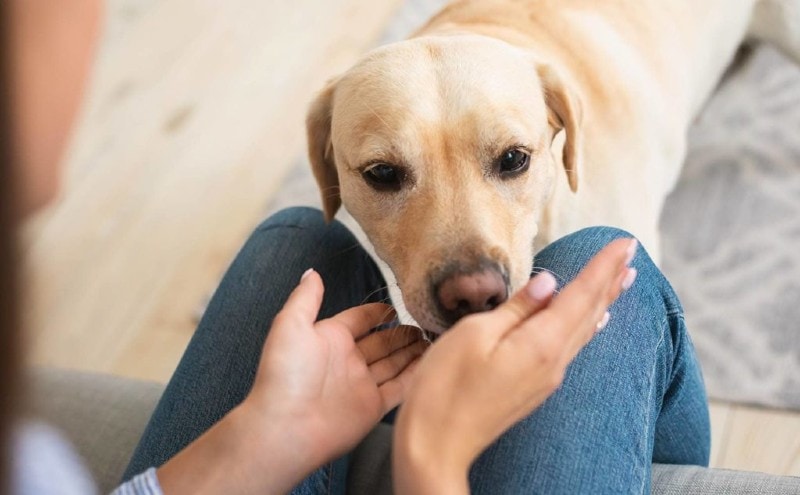Click to Skip Ahead
Ferrets are playful animals and that is why they are becoming more and more popular as pets all over the world. If you’re wondering if ferrets are mean and can be aggressive, you’ve come to the right place. While they aren’t aggressive by nature, there are some situations when a ferret can show signs of aggression—as is true of most animals.
Let’s look closer at when and why ferrets become aggressive and how to handle them in that state.

Is My Ferret Aggressive?
Most people connect ferret biting with aggression, but what they don’t know is that ferrets communicate among themselves by biting each other. When a ferret bites you, it is not intended to be an aggressive move. It means that the ferret wants something from you. That can be an invitation to play, an opportunity to help with some problem, or it may simply want your attention.
Ferrets have thick skin, so when they are biting, they don’t feel pain. We, on the other hand, have thinner skin and almost every bite will cause us pain, even draw blood. It’s important that we understand the motive behind this behavior, but also learn how to curtail it.
The Difference Between Aggressive and Playful Ferrets
Aggressive ferrets always have a hidden cause for their aggression. That means something had to make them act that way. You can easily recognize an aggressive ferret by the way it acts.
- An aggressive ferret will avoid human interaction, stay hidden in a safe place, and attack when a human or any other animal comes too near. The aggressive ferret will often vocalize its fear or discomfort by hissing.
- A playful ferret will be energetic, jump, run around, and probably vocalize their excitement. It will try to get your attention, and invite you (or anyone) to play.

When Are Ferrets Aggressive?
If you have an aggressive ferret, you should know that you can do something about that. In order to correct an aggressive behavior, you must first find out why your ferret is aggressive. So, let’s talk about possible scenarios for why your ferret is behaving aggressively.
Your Ferret Doesn’t Know Better
This is the most common situation with young ferrets. Young ferrets tend to bite hard because they don’t know better. Those ferrets are mostly ferrets from pet shops, pet farms, or backyard breeders. They act that way because no one showed them that biting is forbidden.
If you want a well-behaved ferret, you should look for a good ferret breeder that socializes ferrets from day one up until they go to their new home. Once a ferret knows biting is forbidden, it will probably still bite during the game, but that will be a gentle nip, not a hard bite like it may have done before it was trained.
You Have an Unaltered Male Ferret
Unaltered male ferrets have all their reproductive organs intact. That means they can mate, and during mating season, those ferrets can become aggressive toward everything and everyone around them. It all happens because a male ferret has to show he is the dominant one in his territory.
It is a hormonal reaction. So the best way to minimize or even stop this aggression is to neuter the ferret. Neutering will also reduce the ferret smell, which is much stronger during mating season.
You Have a Sick or Injured Ferret
If you have a good ferret and, out of the blue, it starts to bite when you hold it or any part of its body, that can mean your ferret is injured. In this situation, a ferret is actually showing you that it is hurt and doesn’t want to be touched. If you suspect that your ferret is injured or hurt in any way, go to the vet for a checkup.
Your Ferret May Have Been Abused or Neglected
Unfortunately, there are people who abuse their pets and ferrets are not an exception. When we say abuse, we don’t necessarily mean only physical abuse. An aggressive and abused ferret can be a ferret held in a tiny cage in bad conditions. If a ferret doesn’t spend their energy out of the cage, they become frustrated and their frustration may turn into aggression.
So, if you adopt a ferret from a bad household, you may expect to see some signs of aggression.

How to Deal with an Aggressive Ferret?
Dealing with an aggressive ferret will require caution, patience, and understanding. Remember, ferrets aren’t aggressive by nature. If they are aggressive, there is a problem that causes that behavior. You have to act according to that knowledge. Here are tips on how to deal with an aggressive ferret.
Find the Source of the Aggression
If you want to help an aggressive ferret, you have to know what you are dealing with. Think about your ferret. Where do they come from, how old are they, and do they act that way all the time or in particular situations? Once you find answers to these questions, you will see if the aggression is hormonal, medical, a result of frustration, or maybe even caused by former abuse.

React Accordingly
Based on the information you just deduced, choose one of the following options:
Go to the Vet
If a ferret is injured, go to the vet and help your ferret heal.
Play With Your Ferret
If a ferret is frustrated, help them find a way to burn all that pent-up energy. The best way to do that is to play with a ferret at a safe distance. The overly excited ferret will most likely bite, so a smart move is to lower the excitement level first before you decide to handle the ferret. You can do that by playing with a ferret using toys on strings. Move the toys around so the ferret has to hunt them down.
Let him hunt down the toy from time to time so they can show you their wrestling moves. This way, your hands are safe and the toy will absorb all frustration. After spending energy, you can try to handle the sleepy ferret and let them get used to being cuddled and even picked up.
Teach Your Ferret to Trust Humans Again
If a ferret was abused, the entire process will last longer than usual because a ferret has to learn how to trust humans again. The best way to do that is to wait and be patient.
The first thing you need to do is to let the ferret get used to their new home. Once they are familiar with everything around them, you can come and spend some time with them. You don’t have to interact with them; it is enough just to be near them. You can read a book, simply observe, play a game on your mobile, whatever you want. Once a ferret is ready, it will come to you, and then you can start paying more attention.
First, slowly try to touch them. If they let you do that, you can try to pick them up. If they try to bite you, it means they are not ready so you should wait a little bit more. Let them set the pace of every step.

BONUS: Try Sleep Snuggles
If you really want to cuddle your ferret but he doesn’t allow you, there is one thing you can try. Once ferrets sleep, they sleep hard. That means they won’t wake up so easily so you can exploit that situation. You can pet the sleepy ferret a couple of times and if they are still asleep, you can try to pick them up and place them in your lap.
Sleepy cuddles are a great way for ferrets to get used to human petting, even handling them. Just don’t wake your ferret up suddenly, which may scare them and cause an aggressive response.

Final Thoughts
Ferrets aren’t aggressive animals without any particular reason. Finding out the cause of your ferret’s aggression is as important as knowing how to handle a ferret that acts aggressively. Remember, patience is the key that can turn an aggressive ferret into a cuddle bug.
Featured Image Credit: Fayzulin Serg, Shutterstock










